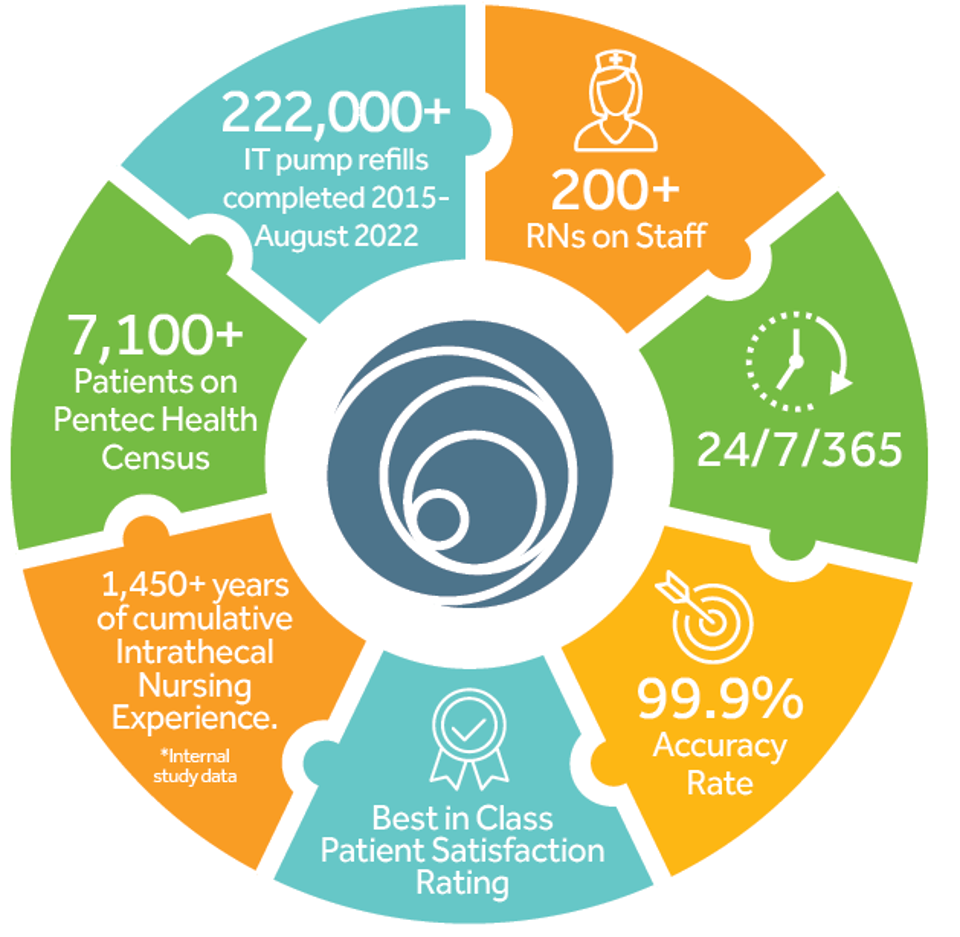
Specialty Care
Infusion treatments, whether at home, in a healthcare clinic or other non-hospital setting, require highly trained Specialty Care nursing and pharmacy support. Trust becomes essential for these higher-risk infusion therapies that require ongoing care.

Clinical Nutrition
Nutrition plays an essential role in sustaining quality of life for those who require care for complex conditions. Pentec Health provides personalized clinical nutrition solutions and superior community-based care.

Disease States
Managing the multifaceted needs for a variety of conditions requiring clinical nutrition and specialty care therapies, services and products. This includes patients with kidney disease, kidney failure, chronic, non-healing wounds, gastrointestinal conditions, rare metabolic disorders, chronic pain, muscle spasticity or cancer within or that has metastasized in the liver.

Clinical Education
By leveraging decades of clinical expertise, we are able to successfully demonstrate our industry leadership through webinars, speaker programs and research studies. We take pride in sharing valuable insights that enhance clinician education and practice.

Pentec Health
Pentec Health is a national leader in clinical nutrition and specialty care integrating pharmacy services with clinical excellence to enhance the complex care journey.


Ready for Your Patients to Discover the Difference?
What is an Implanted Intrathecal Pump?
A medical device surgically implanted into the abdomen with a catheter running from the pump and fixed to the intrathecal space around the spinal cord. A reservoir within the pump holds and delivers physician prescribed medication, which is administered slowly through the catheter to control pain and/or spasticity. Highly trained intrathecal nurses program the pump to dispense the dose specified by the physician and replenish the medication as needed. The frequency of refills is determined by the size of the pump’s reservoir, concentration of the drug as well as the rate in which it is being pumped through the catheter.
This method of medication delivery allows for lower dosing of drugs than would be needed orally or subcutaneously. It also provides highly concentrated medication directly to where it is needed, thereby minimizing side effects and maximizing effectiveness.
At Pentec Health, our expertise in intrathecal pump services make us a trusted partner for providers, managing the complex therapy needs of chronic pain and muscle spasticity patients who require highly skilled infusion nursing as well as pharmacy support.
A Multi-Disciplinary Approach to Enhance Pain Management Outcomes
Best-In-Class Pharmacy Team
Infusion pharmacists and technicians expertly trained to prepare sterile compounded medications in our state-of-the-art specialty pharmacy according to patient-specific prescriptions from anesthesiology, neurology and physiatry prescribers.
Highly Skilled Specialty Care Nurses
Over 200 registered nurses specially trained in the nation’s only accredited intrathecal nurse fellowship program by the American Nurses Credentialing Center (ANCC) to provide infusions, implantable pump management and refill services. Our experienced nursing professionals collaborate with the prescribing physician to develop a customized care plan for each individual patient to help achieve treatment goals.
Additional Patient Services
A dedicated intake team that simplifies the referral process so patients can start on service quickly and reimbursement specialists with expertise in navigating the complexities of insurance coverage including assistance with verification and prior authorizations. This additional support reduces costs as well as removes administrative burdens, which enables physicians to spend more time caring for patients.
Making a Difference in Patient’s Lives
Learn How Patients with Chronic Pain and Muscle Spasticity Benefit from Pentec's Intrathecal Services
Case Study #1
Demographic: Male
Comorbidities: Lumbago, Chronic Back Pain
Acuity: Medium
Patient has a Medtronic IT pump for pain management with a refill interval of 90 days. His nursing care includes the pump refill procedure, pump programming, monitoring, and therapy assessment. Telemetry review is completed with patient and/or caregivers and a comprehensive multisystem assessment is completed at every visit. A pain assessment is also completed to further evaluate the effectiveness of treatment. Alternative pain methods are discussed and reviewed. Vital signs are assessed at each visit. Bowel and urinary patterns are monitored. Teaching is provided related to skincare and wound prevention. Patient has diabetes, so discussions regarding food and lifestyle choices are discussed as needed. Safety and fall risk assessments are completed and any identified risks are addressed. Medical follow-up and reasons to seek follow-up when necessary are reinforced. Anxiety reduction is achieved with in-home refills as patient cannot drive further than 30 miles from his home. The home refill has decreased his anxiety greatly as he is about an hour away from physician office. The patient receives 30-day phone calls to assess for changes in status since previous visit, medication changes, MD visits or hospitalizations, and to address any issues or concerns. Calls to patient are also made prior to next scheduled refill visit to confirm day and time of appointment.
Case Study #2
Demographic: Male
Comorbidities: Cerebral Palsy
Acuity: Medium
Patient is a non-verbal 12 year old boy who is non-ambulatory and non-weight bearing. He has a Medtronic IT pump for management of tone and spasticity. He attends school and is learning methods of communication with an eye tracking device. He receives PT, OT, and speech services at school. He has an unstable living situation and receives Botox injections to arms and legs every 3 months. He receives a high dose of Baclofen and has an alarm date of 30 days. He is seen for IT pump refills approximately every 23-25 days. Patient has high anxiety regarding pump refills and requires restraint from parents or another nurse during procedure. He does not require monthly calls or stat visits. His refill visits include routine refill, pump care and assessment, multisystem assessment, medication reconciliation, assessment of vital signs, assessment of tone and spasticity utilizing the Ashworth scale, and monitoring of bowel and bladder habits. Education is included and reinforced at every visit with family and caregivers to include: Baclofen over- and underdose, identification and treatment for Baclofen emergency, fall prevention, skincare maintenance, identifying changes in tone and spasticity and possible causes. Phone calls are made prior to visits to confirm scheduled refill appointments. Patient is stable on his current ITB dosing and does not require interim adjustment visits.
Case Study #3
Demographic: Female
Comorbidities: Multiple Sclerosis
Acuity: High
Patient has MS and a Medtronic IT pump with Baclofen therapy for the treatment of muscle spasms and spasticity management. She is wheelchair-bound and requires assistance with her care. She receives support from her elderly mother who assists her with medication management and transportation. She has a refill interval of 62 days and is seen for refills approximately every 50 days. Nursing visit includes the pump refill procedure; pump programming, monitoring and therapy assessment. Telemetry review completed with patient and or caregivers. Scheduling is complex due to frequency of hospitalizations and memory impairment. She frequently cancels requiring rescheduling. Monthly phone calls are made by the nurse to assess for changes in tone and spasticity, changes in patient status, medications, or any hospitalizations. In addition to monthly calls visit confirmation calls are made 1-2 times week of scheduled visit. Nurse has gone to home day after visit was confirmed and patient does not answer the door because she forgot. Nursing visits include multisystem assessment, vital signs, assessment of pain, falls assessment and assessment of tone and spasticity utilizing the Ashworth scale. Physician communication as needed to assess therapy and need for adjustments or changes based on nursing assessment. Patient needs constant reminders regarding compliance with managing physician visits. Education is reinforced with every visit as patient is forgetful. Medication side effects, over and under dose symptoms reviewed. Ongoing education with visits and phone calls related to depression, skin breakdown, bowel management and urinary retention. Emotional support provided during visits and calls. Needs assessed for case management intervention referral as needed.


Discover Our Excellence
Pentec has earned an Accreditation with Distinction, the highest recognition bestowed by the ANCC, distinguishing us among fewer than 10 accredited fellowship programs nationwide. Our nurses successfully complete a year-long training in intrathecal studies, demonstrating Pentec’s commitment to quality care of patients with implanted devices and the continuous professional development of our team. The honor of Accreditation with Distinction validates that our nursing program is spearheading the standard of care for intrathecal therapy on a national level.
Ready for Your Patients to Discover the Difference?

Proudly Quality Accredited
National Quality Approval
The Joint Commission

Accredited Practice Transition
Program With Distinction
American Nurses Credentialing Center
By using this website you accept our privacy policy. Choose the browser data you consent to allow:
